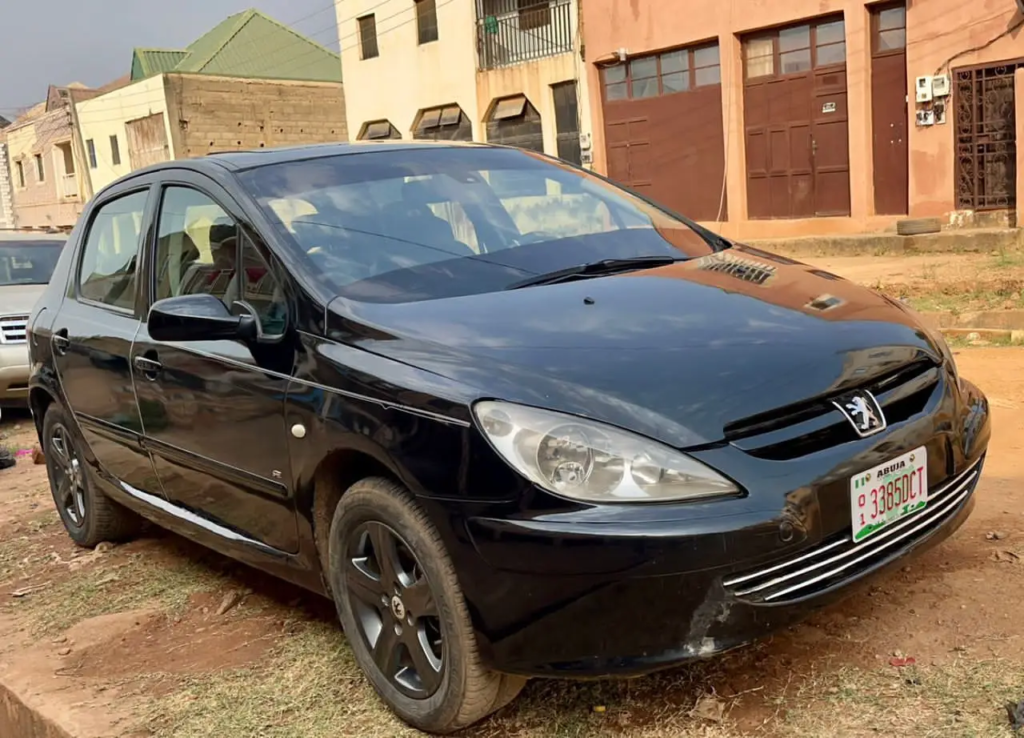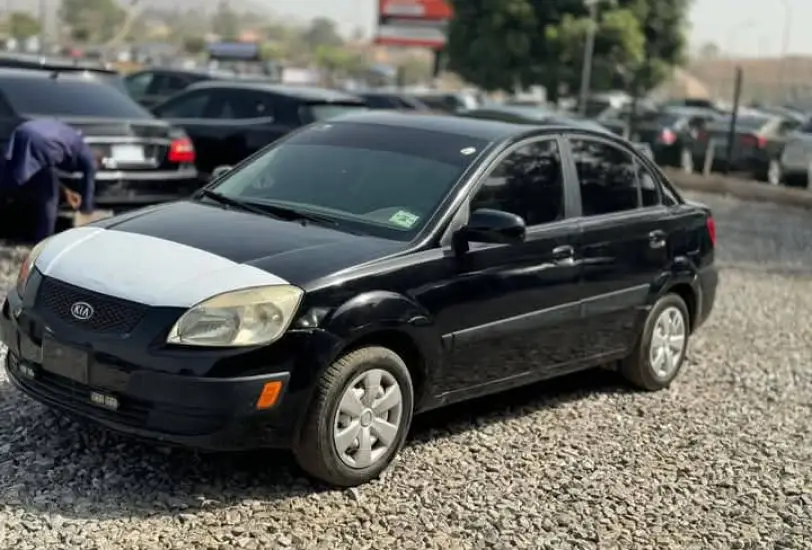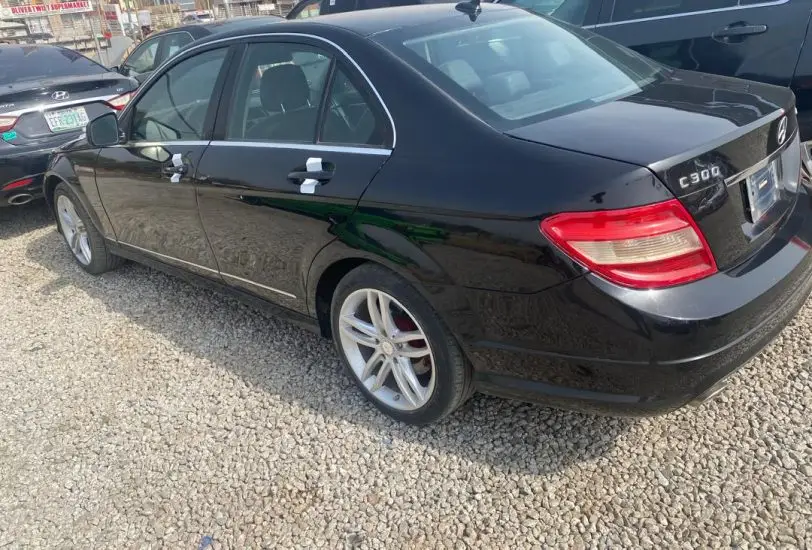So, the time has come. Whether you’re upgrading to a newer model, relocating, or simply need to free up some cash, selling your car is a major financial decision. In a market as vibrant and complex as Nigeria’s, the aspiration is always the same: sell it fast, get the best possible price, and do it all without any “wahala.”
But between this goal and the reality lies a path often filled with low-ball offers from dealers, time-wasters from online marketplaces, the anxiety of scams, and a mountain of confusing paperwork.
You’re not alone in feeling this way. The good news is that with the right strategy, you can navigate this process like a seasoned pro.
This is your ultimate, no-nonsense guide to selling your car in Nigeria. We will walk you through every single step, from preparing your vehicle to make an unforgettable first impression, to accurately pricing it for the Abuja or Lagos market, creating an irresistible online advert, and finally, closing the deal safely and legally.
This comprehensive overview will cover the entire process, with links to our dedicated expert articles for when you need to dive even deeper into a specific topic.
Key Takeaways
Before you list your car for sale, understanding these five core principles will ensure you get the best price, sell faster, and conduct the transaction safely.
- Presentation is Everything: A thoroughly cleaned and detailed car can sell for significantly more than a dirty one. Investing a small amount in deep cleaning the interior/exterior and fixing minor issues like burnt-out bulbs is the highest-return investment you can make before a sale.
- Price It Right with Data, Not Feelings: The single biggest mistake sellers make is guessing the price. Use online marketplaces (like Jiji, Autochek) to research what cars identical to yours (same year, model, and condition) are actually selling for in your area. This data-driven approach is your best tool for negotiation.
- Know Your Selling Options (Profit vs. Speed): Your selling strategy depends on your priority. Selling privately will almost always get you the most money but requires significant time and carries safety risks. Selling instantly to a dealer is the fastest and safest method but will yield the lowest price. Choose the path that best suits your needs.
- Safety First, Always: When selling privately, your personal safety is non-negotiable. Always meet potential buyers in a busy, public place, never go alone, and never hand over the keys or original documents until you have confirmed that a bank transfer is irreversible and cleared in your account.
- Finalize the Paperwork Correctly: The sale is not complete until the Change of Ownership is legally processed. Failing to properly transfer the vehicle’s documents into the new owner’s name can leave you legally liable for anything that happens with that car in the future.
First Impressions Matter: How to Prepare Your Car for a Quick Sale
Before you even think about posting an advert, you must prepare your product. In the competitive used car market, presentation is everything. A well-prepared car not only sells faster but can command a significantly higher price. This initial investment of time and a little money can yield a massive return.
Deep Cleaning and Detailing – The “Wow” Factor
Never underestimate the psychological impact of a sparkling clean car. A clean car signals to a potential buyer that the vehicle has been well-cared for.
- Exterior Wash and Wax: Give the car a thorough wash, paying close attention to the wheels, tyres, and undercarriage. A coat of wax will not only make the paint shine but can also help mask minor scratches and swirls, giving the bodywork a deeper, richer look.
- Interior Detailing: This is arguably more important. This is where your buyer will spend their time.
- Declutter Completely: Remove all personal items. Check every compartment: the glove box, center console, door pockets, and trunk.
- Thorough Vacuuming: Vacuum the carpets, floor mats, and seats meticulously. If possible, use a brush attachment to get into tight corners.
- Wipe Down All Surfaces: Use an appropriate interior cleaner to wipe down the dashboard, door panels, steering wheel, and center console.
- Address Odors: A clean-smelling car feels new. Avoid strong air fresheners, which can seem like you’re hiding something. Instead, consider using a subtle car air neutralizer or simply letting it air out after a deep clean. If there are stubborn smells from spills, a professional interior shampoo might be a worthwhile investment.
Minor Fixes That Add Major Value
You don’t need to perform a major mechanical overhaul, but fixing small, noticeable issues can significantly boost a buyer’s confidence.
- Lights and Bulbs: A burnt-out headlight or brake light is an immediate red flag. Replace all faulty bulbs. It’s an inexpensive fix that shows attention to detail.
- Wiper Blades: If your wipers are streaking, replace them. This is another low-cost item that buyers will notice.
- Fluid Top-Up: Ensure all accessible fluids—engine oil, coolant, and especially windscreen washer fluid—are topped up to their recommended levels.
For a printable checklist, see our detailed guide: [ Preparing Your Car for Sale].
The Million-Naira Question: How to value My Car for Sale Accurately
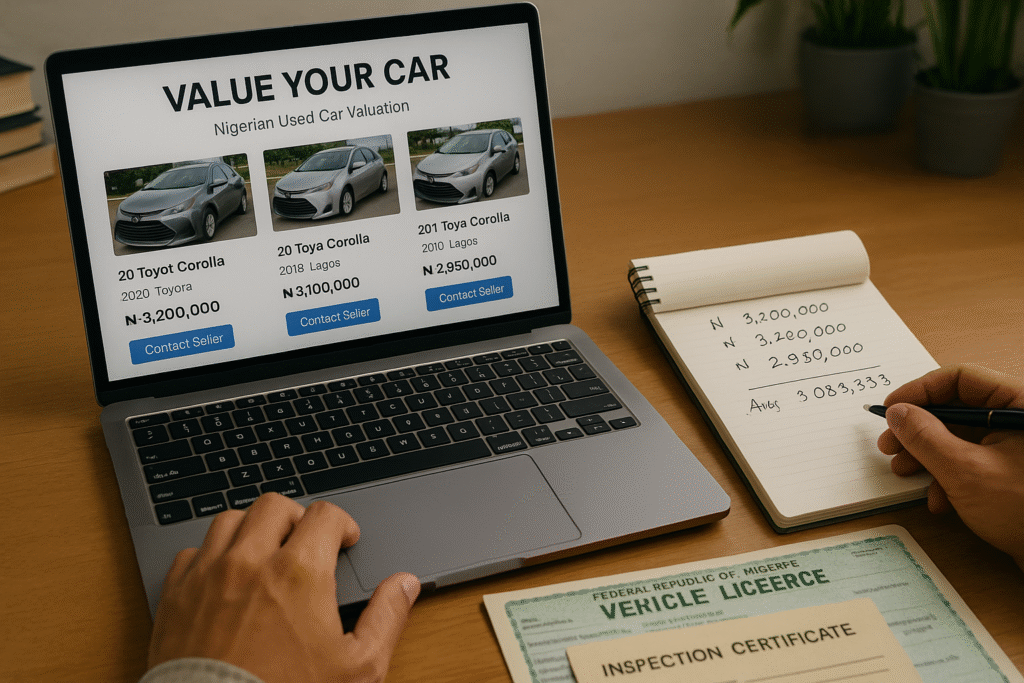
Pricing your car is a delicate balance. Price it too high, and your phone will never ring. Price it too low, and you leave a significant amount of money on the table. The key is to be objective and data-driven.
Here’s how to determine a realistic market value for your vehicle in Nigeria:
1. Conduct a Comparative Market Analysis (CMA): This is your most powerful tool. Spend time on major online marketplaces like Jiji, Cheki, and dealer websites like Autokunbo.com. Search for cars that are the same make, model, year, and trim level as yours. Pay close attention to:
- Condition: Is the car listed as “Tokunbo” or “Nigerian Used”? Is it “First Body”? Be honest about how your car compares.
- Mileage: Note the mileage of comparable cars.
- Location: Prices in Lagos can sometimes differ from those in Abuja or Port Harcourt. Focus on listings in your immediate region.
- Create a list of 5-10 comparable cars and their asking prices to establish a realistic baseline.
2. Understand the Key Factors That Influence Price:
| Factor | Impact on Price | Expert Note |
| Vehicle Condition | Very High: This is the most significant factor. A “First Body” car with a clean interior and no visible damage will always command the highest price. | Be brutally honest with yourself. What you see as a “minor scratch” a buyer might see as a reason to negotiate ₦100,000 off the price. |
| Mileage | High: Lower mileage is almost always better, as it suggests less wear and tear on the engine and drivetrain components. | While verifiable mileage is important, a high-mileage car with a complete and impeccable service history can sometimes be more valuable than a low-mileage car with no records. |
| Service History | High: A complete, documented service history is a massive trust signal and a powerful negotiating tool. | Even if you used independent mechanics, presenting a folder with receipts for oil changes, brake jobs, and major repairs shows you cared for the car. |
| Model Year | Medium-High: Newer cars are naturally worth more, but the specific “generation” of a model is also crucial (e.g., a 2012 “Big Daddy” Camry vs. a 2011 model). | |
| Trim Level (LE, XLE, SE, Sport, etc.) | Medium: Higher trim levels with more features (leather seats, sunroof, advanced tech) will fetch a higher price than base models. | Make sure you accurately list your car’s trim level in your advert. |
3. Use Professional Valuation Services: For a more formal valuation, consider using a service from a reputable platform. They use aggregated market data to provide a fair market value, which can be a strong starting point for your pricing strategy.
For a step-by-step guide to pricing, read: [How to Price Your Used Car].
Choosing Your Sales Channel: Sell Car Privately vs Dealer
Once your car is prepped and priced, you need to decide how you’re going to sell it. In Nigeria, you have three primary paths, each with a clear trade-off between profit, time, and safety.
| Sales Channel | Maximum Profit | Speed & Convenience | Safety & Peace of Mind |
| Selling Privately (e.g., on Autokunbo or Jiji) | ★★★ | ★☆☆ | ★☆☆ |
| Selling to a Dealer (Instant Sale) | ★☆☆ | ★★★ | ★★★ |
| Selling via Consignment (e.g., Autokunbo) | ★★☆ | ★★☆ | ★★★ |
Selling Privately
This involves listing your car yourself on a platform like Jiji or Facebook Marketplace and handling every aspect of the sale—from answering calls and arranging viewings to negotiating the price and handling the final transaction.
- Pro: You have the potential to get the highest possible price for your car, as there’s no middleman.
- Con: It is incredibly time-consuming. You will deal with dozens of calls, many from non-serious “time-wasters.” More importantly, it carries significant security risks, requiring you to meet with complete strangers and handle a large financial transaction yourself.
Selling to a Dealer (Trade-in or Instant Cash Offer)
This is the fastest and safest way to sell your car. You simply drive to a reputable dealership, they inspect your car, and they give you an on-the-spot cash offer.
- Pro: The process is instant, secure, and hassle-free. You can have money in your bank account the same day.
- Con: This will be the lowest price you get for your car. The dealer needs to buy it at a wholesale price so they can recondition it and sell it for a profit.
Selling via a Consignment Service (The Hybrid Approach)
This model, offered by platforms like Autokunbo.com, provides a balance. You hand the car over to the dealership, and they handle the marketing, inspection, negotiations, and secure payment on your behalf, taking a small commission after the sale.
- Pro: You get a much better price than an instant sale, and you get the full safety and convenience of a professional dealership handling the entire process.
- Con: It is not instant. It may take a few days or weeks to find the right buyer.
Explore the pros and cons in-depth in our guide: [Selling Privately vs. Selling to a Dealer].
Mastering the Online Sale: Creating an Irresistible Advert
If you choose to sell privately, the quality of your online advert is everything. It’s your one chance to make a first impression and attract serious buyers.
Taking Photos That Sell Your Car Faster
Your photos are 90% of your advert. A car with bad photos will be ignored, even if it’s a great deal. A car with amazing photos will attract premium buyers.
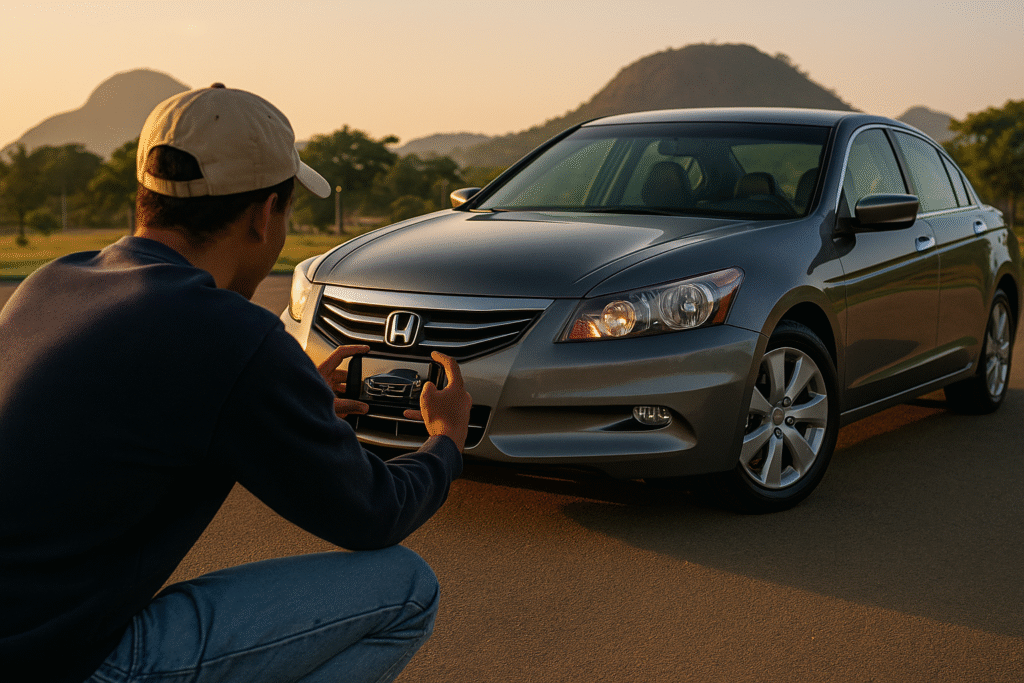
- Location is Key: Find a clean, uncluttered background. An empty parking lot or a quiet, scenic spot works best. Avoid busy backgrounds with other people or distracting objects.
- Lighting is Everything: The best time to shoot is during the “golden hour”—the first hour after sunrise or the last hour before sunset. The light is soft and makes the car’s paint look rich. Avoid harsh midday sun, which creates ugly reflections.
- The Essential Shot List (Minimum 15-20 Photos):
- Front 3/4 Angle (The “Hero” Shot)
- Rear 3/4 Angle
- Direct Side Profile
- Direct Front and Rear
- Dashboard and Steering Wheel
- Front Seats & Back Seats
- Odometer (showing the exact mileage)
- Engine Bay (make sure it’s clean!)
- Trunk (show the space)
- Tyre Treads (show they are in good condition)
- Close-ups of any special features (sunroof, infotainment screen)
- Be Honest: Include clear photos of any significant scratches or dings. This builds trust.
Learn the secrets in [Taking Great Photos to Sell Your Car Faster].
Writing a Compelling Description
Your words close the deal your photos started. Be clear, concise, and honest.
- Title: Be specific.
For Sale: 2012 Toyota Camry XLE (First Body, 85,000km)is infinitely better thanClean Camry For Sale. - Summary: A one-sentence summary at the top. “A meticulously maintained 2012 Toyota Camry XLE with low mileage and a complete service history. Perfect for a family or as a reliable daily driver.”
- Bullet Points: List the key features for easy scanning (e.g., V6 Engine, Leather Seats, Sunroof, Reverse Camera, etc.).
- Detailed Description: Write a paragraph about the car’s condition, why you’re selling it, and any recent maintenance performed.
- Price and Contact: Clearly state your asking price and your preferred method of contact.
Use our template in [Creating the Perfect Online Car Advert].
The Transaction: How to Sell a Car Without Getting Scammed
This is the most anxiety-inducing part of a private sale. Prioritizing your safety is paramount.
- Screening Buyers: When someone calls, be polite but firm. A serious buyer will ask intelligent questions about the car’s history and condition. A “time-waster” will often start with an unreasonably low offer without even seeing the car.
- Arranging Viewings and Test Drives:
- Never meet at your home. Choose a safe, public location like a well-lit shopping mall parking lot or even outside a police station.
- Go with a friend. Never go to a viewing alone.
- Get their details. Take a photo of the potential buyer’s ID or driver’s license before they start the test drive.
- Accompany them on the test drive. Never let a stranger drive your car alone.
- Negotiating and Payment:
- Be prepared to negotiate, but know your “walk-away” price.
- NEVER accept personal cheques. For payment, strongly prefer a confirmed bank transfer. Go with the buyer to their bank to witness the transfer. Do not hand over the keys or any documents until you have confirmed the funds are cleared and irreversible in your account.
- Finalizing the Paperwork: Once payment is confirmed, sign the required transfer documents and provide the buyer with all the original car papers.
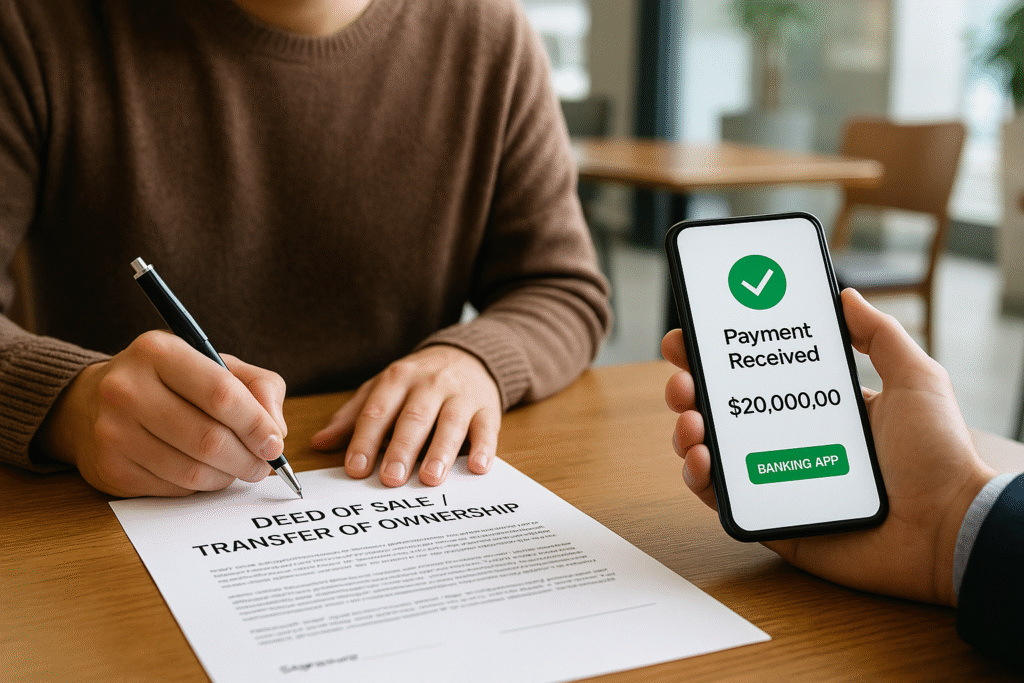
Protect yourself with our guide: [Avoiding Scams When Selling a Car]. And get the legalities right with our checklist: [Required Documents for Vehicle Transfer].
The Special Case: Selling a Financed Car in Nigeria
What if you still owe money on your car loan? Selling it is possible but requires extra steps.
- Contact Your Lender: Your first call should be to the bank or finance company that holds the loan. You need to request the “loan settlement figure”—the exact amount required to pay off the loan completely on a specific date.
- Inform the Buyer: You must be transparent with any potential buyer that the car has outstanding finance.
- The Transaction: The safest way to do this is at the bank. The buyer transfers the full amount, you use part of it to pay the lender the settlement figure right there, and the lender provides a letter confirming the loan is cleared. The remaining balance is yours. Only then do you transfer ownership.
- Selling to a Dealer: This is often easier. A reputable dealership like Autokunbo.com can handle the entire process, getting the settlement figure from your bank and managing the payoff as part of the transaction.
For a detailed walkthrough, read our expert guide: [Selling a Car That is Still Under Finance].
Conclusion: Closing the Deal with Confidence
Selling your car in Nigeria doesn’t have to be a stressful ordeal. The key to a successful, profitable, and safe sale is simple: preparation and diligence. By presenting your car in its best light, pricing it based on real market data, choosing the right sales channel for your needs, and prioritizing your safety during the transaction, you can take full control of the process.
Ready to sell your car without the “wahala”? Autokunbo.com offers a safe, transparent, and profitable way to find a trusted buyer. List your car for sale today or get a free, data-driven valuation today and let us show you a better way to sell your car.



